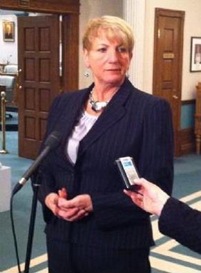Kathy Dunderdale showed up in the province again to talk about the wonderful reception her Muskrat Falls megadebt project got from the New England governors.
Two things stood out right off the bat from Dunderdale’s scrum.
First, there was her reference to Yvonne Jones as if the Liberal leader hadn’t already drunk the freshie. Jones supports the project for the same reason Dunderdale does: “significant employment and income to the residents and businesses of Newfoundland and Labrador”.
That those short-term jobs will come at such a terrible price - doubling electricity rates and doubling the public debt - won’t bother the placeholders one bit; none of the province’s political parties are concerned about such triflings when then can buy votes with public money.
Second was Dunderdale’s response to a question about comments by Connecticut Governor Dannel Molloy about the need for timely discussion between Canadian province’s and New England states about importing Canadian electricity. He also noted the need for improved transmission infrastructure to move the power along.
Dunderdale reminded the reporters at her scrum that Molloy was a newbie, only in office since January. Then she carried on with the usual song and dance about how hydro is the answer to everyone’s prayers.
The fundamental problems with Muskrat Falls still remain. Nottawa reminded everyone of the basic problem in a post that ran on Tuesday. Connecticut’s current retail price for electricity is 40% below Muskrat Falls’ projected cost price.
What he forgot to add was the transmission cost. That’s also something Vermont Governor Pete Shumlin was talking about when he told reporters during the recent New England Governor’s and Eastern Canadian Premiers’ conference that:
… the most pressing question that needs to be resolved is how to get Canadian power to northern U.S. markets without boosting transmission capacity.
"There is no universal plan to get it there," Shumlin said.
Muskrat power will cost somewhere in the neighbourhood of 14 to 16 cents per kilowatt hour to produce. Then it has to roll through a couple of Canadian province’s and three or four American states. In every one of those jurisdictions there will be at least one transmission charge whacked on top.
That’s what Shumlin was talking about. Even if by some hysterical development 16 cents a kilowatt hour became cheap electricity in New England, adding another 50% on top of that to move it around just prices the juice out of the market altogether.
Well, that and the fact that people in his state and elsewhere in New England just don’t want new hydro lines slung across their states. New Hampshire opposition to a new line is just one example.
As you listen to Dunderdale, Jones, Michael and other politicians ramble on about Muskrat Falls you just get the sense they are in some sort of bizarre alternate universe. They are out of touch with reality and news media keep repeating their comments as if they were rational.
The Telegram, alone among local media outlets, is finally getting the message. Its editorial on Saturday and again on Tuesday laid out the naked truth about Muskrat Falls and the provincial government’s enormous debt. The others, like VOCM, just continue to enable the delusions.
- srbp -
